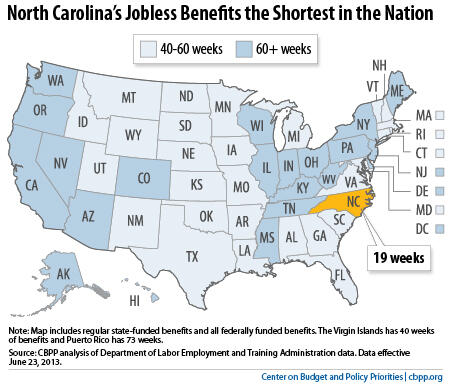BEYOND THE NUMBERS
North Carolina, with one of the nation’s highest unemployment rates at 8.8 percent, imposed cuts in unemployment benefits today that are truly breathtaking:
- Jobless workers can now receive only 19 weeks of benefits — less than half what any other state offers, even states like North Dakota where the economy is much stronger (see map). The previous limit, similar to other states with relatively high unemployment, was 63 weeks: 26 weeks of state-funded benefits plus another 37 weeks of federally funded emergency benefits for which North Carolina has now disqualified itself, as explained below.This huge cut in how long jobless workers can receive benefits is particularly cruel given that 53 percent of claimants in North Carolina already exhaust their state-funded benefits before they can find a job.Image

- Some 70,000 unemployed workers will lose emergency federal benefits right away. Another 100,000 or so will lose benefits that they would have received over the next several months.
- Cuts in who can qualify for benefits, how much they receive, and for how long will slash total payments of state-funded benefits by nearly three-quarters by 2021, compared to the previous rules.
Making these unemployment benefit cuts even more obscene are other actions that North Carolina’s leaders are taking, including letting the state’s earned income tax credit for low-income working families expire, eliminating its tax on wealthy estates, and considering other expensive tax cuts that would largely benefit the well-off at the expense of the poor and middle class.
How did North Carolina’s jobless workers wind up with just 19 weeks of benefits, making the state such an outlier?
For starters, North Carolina is cutting the maximum number of weeks of state-funded benefits from 26 to 19 immediately, and to as few as 12 when the economy improves. That change alone sets the state apart. For decades, the standard across the country has been 26 weeks of regular, state-funded unemployment benefits; before the recent recession, every state met or exceeded it.
In addition, North Carolina’s massive cut in benefit levels violates federal rules that require states that accept emergency federal benefits to maintain their benefit levels. That requirement is designed to ensure that the emergency federal funding reaches jobless workers rather than simply replace state funds. States that cut their benefit levels can no longer receive emergency benefits. The federal government has ended those benefits only for North Carolina.
The loss of federal benefits hurts not only jobless workers but also the state’s struggling economy, depriving it of some $600 million in federal funds that would have gone over the next several months to North Carolinians, who would have spent most of it locally.
It’s hard to imagine a more extreme attack on unemployed workers and their families.
